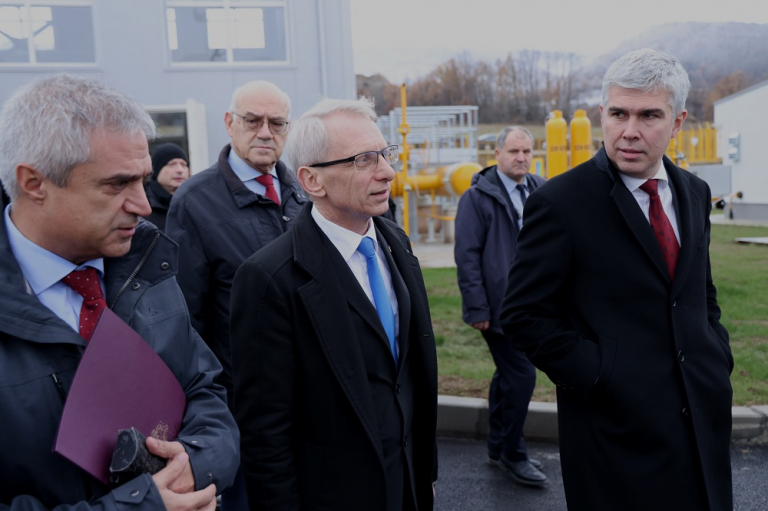
08.12.2023
Greater energy security for Bulgaria and Serbia and a possibility for gas supply to the communities in the region are just some of the benefits of the new gas interconnection that was inspected today by Prime Minister Acad. Nikolai Denkov and Energy Minister Rumen Radev. Near Kalotina, they visited the gas metering station where the Bulgartransgaz Executive Director Vladimir Malinov assured them of the operational readiness of the project.
“Owing to the gas pipeline, Bulgaria gets access to gas sources from Western Europe along a totally new route,” Prime Minister Acad. Nikolai Denkov noted for the media onsite. As he said, the country already enjoys far better energy connectivity, which means more opportunities and stronger negotiating positions for Bulgaria, as well as more competition in the region. “It is a station that in addition to the supply of gas to Serbia, can handle a reversible flow and, if needed, Bulgaria can be supplied with gas alike,” Acad. Nikolai Denkov stressed. The annual transportation capacity is 1.8 billion cubic meters of natural gas. Moreover, Serbia, gains access to the LNG terminals in the region and to the Southern Gas Corridor.
The total length of the Bulgaria-Serbia Interconnection (IBS) is 170 kilometers stretching from the town of Novi Iskur in Bulgaria to the town of Nis in Serbia. In the Bulgarian territory, the infrastructure comprises a 62-kilometer long gas pipeline and attending facilities – waste treatment units, cranes, a gas metering station, gas pipeline derivations and automatic gas distribution stations nearby the towns of Slivnitsa and Dragoman.
The importance of the project for the energy security of South-Eastern Europe is proven by the European Commission that awarded it the status of a “Project of Common Interest (PCI) for the EU”. A Council of Ministers decision declared the infrastructure in the Bulgarian territory a national project and a project of national importance. The IBS is in synergy with the gas infrastructure development projects across the region – LNG terminals, including the terminal in Alexandroupolis, the expansion of the Underground Gas Storage (UGS) Chiren and the construction of new and the expansion of existing gas pipelines. The IBS is an important tool to achieve the goals of diversification of supplies and improvement of the natural gas supply security for both Bulgaria and Serbia as well as for the rest of the countries in the region, owing to the existing infrastructure in both countries – interconnections and gas storage facilities.